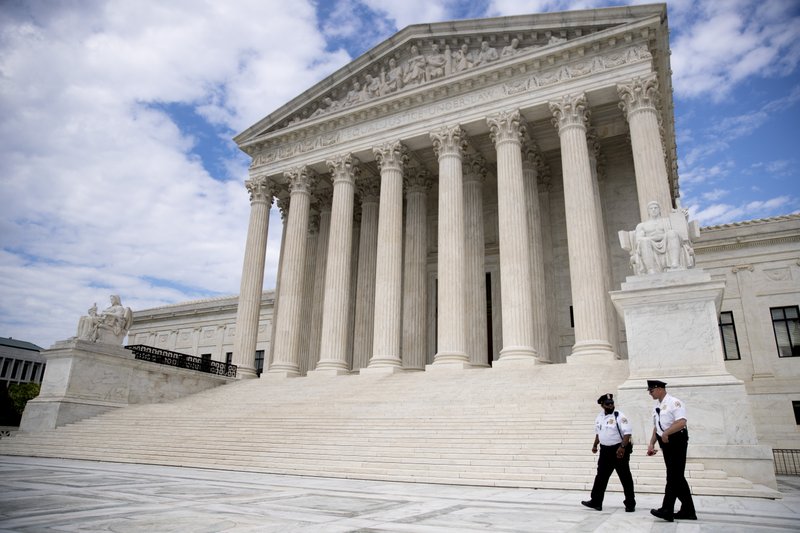WASHINGTON -- The Supreme Court on Wednesday temporarily prevented the House of Representatives from obtaining secret grand jury testimony from former special counsel Robert Mueller's Russia investigation.
The court's unsigned order granted the Trump administration's request to keep previously undisclosed details from the investigation of Russian interference in the 2016 election out of the hands of Democratic lawmakers, at least until early summer.
The court will decide then whether to extend its hold and schedule the case for arguments in the fall.
The federal appeals court in Washington ruled in March that the documents should be turned over because the House Judiciary Committee's need for the material in its investigation of President Donald Trump outweighed the Justice Department's interests in keeping the testimony secret.
Mueller's 448-page report, issued in April 2019, "stopped short" of reaching conclusions about Trump's conduct, including whether he obstructed justice, to avoid stepping on the House's impeachment power, the appeals court said.
The committee was able to persuasively argue that it needed access to the underlying grand jury material to make its own determinations about the president's actions, the court said.
The materials initially were sought last summer, but by the time the appeals court ruled in March, Trump had been impeached by the House and acquitted by the Senate.
The Justice Department said in its Supreme Court filings that the court's action was needed in part because the House hasn't given any indication it "urgently needs these materials for any ongoing impeachment investigation."
The House had opposed the delay on the grounds that its investigation of Trump was continuing, and that time is of the essence because of the approaching election. The current session of the House will end Jan. 3, and lawmakers elected in November will take their seats.
The committee investigation "continues today and has further developed in light of recent events," the House told the justices, citing the "possible exercise of improper political influence" on decisions to seek a shorter prison term for Trump confidant Roger Stone and end the prosecution of former national security adviser Michael Flynn.
Mueller's report detailed multiple interactions between the 2016 Trump campaign and Russia, and examined several episodes involving the president for potential obstruction of justice. Mueller said his team did not find sufficient evidence to establish a criminal conspiracy between the campaign and the Kremlin to tip the election, though noted that he could not exonerate the president for obstruction.
Portions of the report were blacked out, including grand jury testimony and material that Mueller said could harm ongoing investigations or infringe on the privacy of third parties.
Meanwhile, a Republican effort to determine who may have leaked Flynn's name in connection to his 2016 contact with the Russian ambassador has centered on the question of which Obama administration officials requested his identity be "unmasked" in intelligence documents.
But in the FBI report about the communications between the two men, Flynn's name was never redacted, U.S. officials said.
Senate Judiciary Committee Chairman Lindsey Graham, R-S.C., announced this week that he wants to subpoena witnesses over the unmasking of Flynn as part of a larger effort to unearth information about the FBI's investigation of Trump campaign officials.
On Tuesday, he sent a letter to acting Director of National Intelligence Richard Grenell asking why a declassified list of Obama administration officials who had made requests that revealed Flynn's name in intelligence documents "did not contain a record showing who unmasked" Flynn's identity in relation to "his phone call with" the Russian diplomat, Sergey Kislyak.
Flynn's Dec. 29 phone calls with Kislyak became a major controversy.
He resigned as President Trump's national security adviser shortly after the revelations and later pleaded guilty to lying to the FBI about the call. The Justice Department is now seeking to drop the case.
"When the FBI circulated [the report], they included Flynn's name from the beginning" because it was essential to understanding its significance, said a former senior U.S. official, who spoke on the condition of anonymity to describe sensitive intelligence. "There were therefore no requests for the unmasking of that information."
When told by The Post that the name was never masked in the Dec. 29 communication, a Graham aide said the committee would still like a "written answer" to its question from Grenell's office.
Information for this article was contributed by Mark Sherman of The Associated Press and by Ellen Nakashima of The Washington Post.
A Section on 05/21/2020
